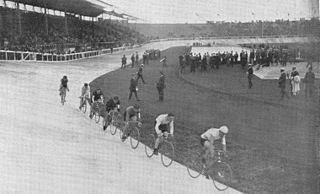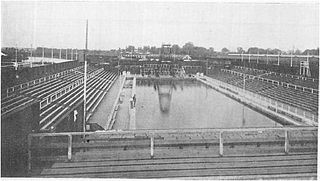The men's 100 metres was the shortest of the sprint races at the 1908 Summer Olympics in London. The competition was held over the course of three days. The first round was held on 20 July, the semifinals on 21 July, and the final on 22 July. NOCs could enter up to 12 athletes, The event was won by Reggie Walker of South Africa, the first time the gold medal went to a nation other than the United States. The Americans did stay on the podium with James Rector's silver medal. Canada won its first medal in the event, a bronze by Robert Kerr.

The men's 200 metre race was held for the third time at the 1908 Summer Olympics in London. The competition was held from 21 to 23 July 1908. NOCs could enter up to 12 athletes. 43 sprinters from 15 nations competed. The event was won by Robert Kerr of Canada, the first win by a nation other than the United States. Americans took silver and bronze, with Cartmell becoming the first person to win multiple 200 metres medals after taking earning silver in 1904.
The men's 1500 metres was an Olympic event for the fourth time at the 1908 Summer Olympics. The competition was held on 13 and 14 July 1908. The races were held on a track of 536.45 metres=1⁄3 mile in circumference. The event was won by Mel Sheppard of the United States, the second consecutive Games an American had won the event. Sheppard, like Jim Lightbody in 1904, would also win the 800 metres for a middle-distance double.

The men's 400 metres hurdles was the longer of two hurdling events at the 1908 Summer Olympics in London. It was the third time the event had been featured at the Olympics. The Olympic record was beat three times in the course of the Games. The competition was held from Monday, July 20, 1908, to Wednesday, July 22, 1908. 15 runners from six nations competed. NOCs could enter up to 12 athletes. The event was won by Charles Bacon of the United States, defeating teammate and defending champion Harry Hillman by 0.3 seconds in the final. It was the third gold medal in three Games for the American team in the event. Hillman was the first man to earn multiple medals in the 400 metres hurdles. Jimmy Tremeer of Great Britain earned bronze, the first medal for the nation in the men's 400 metres hurdles.
The men's 660 yards was one of seven track cycling events on the Cycling at the 1908 Summer Olympics programme. It was the shortest of the events. The 1908 Games was the only time when the 660 yards event was part of the Olympic cycling program. Each nation could enter a maximum of 12 cyclists.

The men's 20 kilometres was one of seven track cycling events on the Cycling at the 1908 Summer Olympics programme. Its distance was the second longest of the individual event distances. Each nation could enter up to 12 cyclists.
The men's team pursuit was one of seven track cycling events on the Cycling at the 1908 Summer Olympics programme. It was the first appearance of a pursuit-style event. Each nation could enter 1 team of 4 cyclists.

The men's 100 metre freestyle was one of six swimming events on the swimming at the 1908 Summer Olympics programme. It was the shortest of the three individual freestyle events, as the 50 yard freestyle had been dropped after its one appearance on the 1904 Summer Olympics programme. The 100 metre event was contested for the third time after it had been held at the 1896 and 1906 Olympics. The 1904 Olympics saw a 100-yard event. The competition was held on Friday 17 July 1908 and Monday 20 July 1908. Thirty-four swimmers from twelve nations competed. Each nation was limited to 12 swimmers.
The men's 400 metre freestyle was one of six swimming events on the swimming at the 1908 Summer Olympics programme. Its distance was the median of the 3 individual freestyle event distances. It was the first time an event over 400 metres was held at the Olympics. The competition was held from Monday July 13, 1908 to Thursday July 16, 1908.
The men's 1500 metre freestyle was one of 6 swimming events on the swimming at the 1908 Summer Olympics programme. Its distance was the longest of the 3 individual freestyle event distances. The competition was held from Tuesday July 21, 1908, to Saturday July 25, 1908.
The men's 100 metre backstroke was one of six swimming events on the swimming at the 1908 Summer Olympics programme. It was the only backstroke event on the schedule. It was the first appearance of the event, after a 100-yard event was held in 1904. The competition was held on Thursday July 16, 1908 and on Friday July 17, 1908.

The men's 200 metre breaststroke was one of 6 swimming events on the Swimming at the 1908 Summer Olympics programme. It was the only breaststroke event on the schedule. 1908 was the first appearance of the 200 metre breaststroke, as 1904 had seen the introduction of the stroke to Olympic competition with the 440 yard event. Each nation could enter up to 12 swimmers.

The men's 200 metres was a track and field athletics event held as part of the Athletics at the 1912 Summer Olympics programme. It was the fourth appearance of the event, which has appeared at every edition of the Summer Olympics since the 1900 Summer Olympics. The competition was held on July 10, 1912, and on July 11, 1912. 61 runners from 19 nations competed. NOCs could enter up to 12 athletes. The event was won by Ralph Craig of the United States, the nation's third victory in four Games. Another American, Donald Lippincott, took silver. Great Britain earned its first medal in the 200 metres with Willie Applegarth's bronze.

The men's 100 metre freestyle was a swimming event held as part of the swimming at the 1912 Summer Olympics programme. It was the fourth appearance of the event, which had not been featured at the 1900 Games. The competition was held from Saturday July 6, 1912, to Wednesday July 10, 1912. Thirty-four swimmers from twelve nations competed. The event was won by Duke Kahanamoku of the United States, the nation's second consecutive victory in the event. Cecil Healy took silver, the only medal in the event for Australasia, the short-lived joint team of Australia and New Zealand. Another American, Ken Huszagh, took bronze.
The men's 4 × 200 metre freestyle relay was a swimming event held as part of the swimming at the 1912 Summer Olympics programme. It was the second appearance of the event, which had been introduced in 1908. The competition was held on Friday July 12, 1912 and Monday July 15, 1912.
These are the official results of the Men's Tandem Race at the 1972 Summer Olympics in Munich, West Germany held on 3 to 4 September 1972. There were 28 participants from 14 countries.

The men's sprint event was part of the track cycling programme at the 1920 Summer Olympics. There were 37 competitors from 11 nations, with each nation apparently limited to four cyclists. The event was won by Maurice Peeters of the Netherlands, the nation's first victory in the men's sprint. Two British cyclists, Thomas Johnson and Harry Ryan, were in the final as well, taking silver and bronze.

The men's 100 metre freestyle was a swimming event held as part of the swimming at the 1928 Summer Olympics programme. It was the seventh appearance of the event, which had not been featured only at the 1900 Games. The competition was held on Friday and Saturday, 10 and 11 August 1928. Thirty swimmers from 17 nations competed. Nations had been limited to three swimmers each since the 1924 Games. Johnny Weissmuller of the United States repeated as gold medalist in the event, the second man to do so. It was the fifth consecutive victory for an American swimmer in the men's 100 metre freestyle. István Bárány earned Hungary's first medal in the event since 1908 with his silver. Katsuo Takaishi's bronze was Japan's first men's 100 metre freestyle medal. Bárány and Takaishi prevented the Americans from sweeping the medals a third consecutive time, as the United States swimmers finished first, fourth, and fifth.

The men's 100 metre freestyle was a swimming event held as part of the swimming at the 1936 Summer Olympics programme. It was the ninth appearance of the event, which had not been featured only at the 1900 Games. The competition was held on Saturday and Sunday, 8 and 9 August 1936. Forty-five swimmers from 23 nations competed. Nations had been limited to three swimmers each since the 1924 Games. The event was won by Ferenc Csik of Hungary, the nation's first victory in the event since 1904 and third overall. For the second consecutive Games, Japan took two medals in the 100 metre freestyle, this time silver and bronze. The United States' seven-Games medal streak in the event ended as the nation's best result was sixth place by Peter Fick.
The men's 100 metre backstroke was a swimming event held as part of the swimming at the 1936 Summer Olympics programme. It was the seventh appearance of the event, which was established in 1908. The competition was held from Wednesday to Friday, 12 to 14 August 1936.








